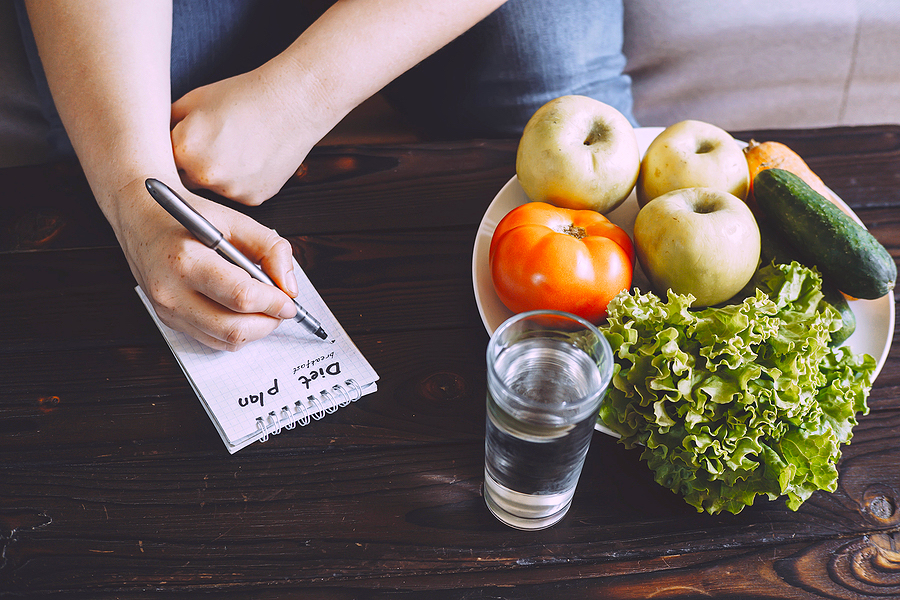Over the last few years, new year’s resolutions have become something of a divisive topic! Do they work? Do they matter? Should you set them? Is “resolutions” the right word? No matter what you call it, I do think that a new year is a great time to reflect, reset, and set intentions.
Generally, the trouble with new year’s resolutions is that it’s become almost accepted that we don’t follow through with them. We set goals that are either unattainable, unsustainable, or that just haven’t been carefully thought through, and then we start by becoming a slave to them before giving up entirely, and feeling bad about it.
In my experience, the best way to approach resolutions or intention setting for the new year is to come up with principles and guidelines that you can keep in mind and work towards gradually throughout the year.
It’s also crucial that you really believe in the intentions or goals that you set, and your ability to work them into your life! If you’ve halfheartedly written “go to the gym 3 times a week” on your new year’s resolutions list for the last 5 years but have never made it a habit, it’s time to approach that goal differently.
For example, start by asking yourself why you wanted to go the gym (i.e. to become stronger, to increase your energy levels, to lose weight). And then ask yourself why the gym hasn’t worked out for you, and if there might be another way that you can approach the underlying goal of becoming more fit, stronger, or healthier.
Goals and resolutions don’t have to be big or flashy. In most cases, it’s actually a combination of relatively minor lifestyle changes that add up to big health improvements. Chronic illnesses and most common health complaints are caused at least in part by environmental and lifestyle factors, from diet to toxin exposure to stress.
20 Little Things You Can Do to Make 2020 Your Healthiest Year Yet
Here, I will share with you some of the most important “little” things you can do that, especially when put together, will set you up for your healthiest year yet, no matter where you are in your wellness journey.
1. Make sleep a top priority
We all know that sleep is necessary, but when we’re chronically busy, it tends to be one of the first things that we neglect. We think that we’ll just go to sleep an hour or two later, or get up an hour or two earlier, and we’ll get more done… but insufficient sleep actually makes us less focused, less productive, and more prone to things like chronic disease and weight gain. Beyond the number of hours you get every night, it’s also important to set yourself up for good quality sleep by minimizing device use and light of any kind before bed, avoiding caffeine in the afternoon, and trying natural, herbal approaches to sleeplessness as required. Some of my top evidence-based tips for better sleep can be found here.
2. Check your vitamin D levels
Vitamin D is one of the most important nutrients for women. It’s also one of the most common deficiencies in this country! I recommend getting your vitamin D levels tested twice a year, and supplementing as necessary. Without supplementation, the best way to get your dose of vitamin D is with direct sun-to-skin exposure. Of course, this is not always easy, especially in the winter! Source a high quality vitamin D supplement for benefits that may include better immune function, an improved mood, and increased bone strength.
3. Replace toxic cosmetics & cleaning products
Did you know that women are exposed to about 168 different chemicals every day? It’s a shocking statistic, and although we can’t expect to eliminate all chemical exposure, we can make informed decisions about what kinds of chemicals we allow into our homes, especially when it comes to products like cosmetics and cleaning products where we have lots of choice. There’s no need to dump all of your products out all at once– start by replacing one cosmetic item and one cleaning product with pesticide and chemical-free alternatives, and then keep going. You can learn more about the chemicals in cosmetics in my blog post here.
4. Embrace where you are
If you’re going through perimenopause or any other kind of stressful transition or hormonal change, it can be easy to feel overwhelmed and off balance. I am a firm believer in the importance of accepting and embracing where you are, so that you can focus on being present and living a healthy, peaceful life. If you are experiencing symptoms of a hormonal imbalance, focus on getting to the root of the problem and healing naturally with the help of a functional medicine practitioner.
5. Adopt a healthy, balanced diet
The new year is a time when many people start new, fad diets in the hopes of losing weight quickly. Unfortunately, these fad diets are generally not sustainable, not healthy, and not effective in the long term. Rather than jumping on the bandwagon of an extreme or trendy diet, try to focus on mastering a healthy, balanced diet that is filled with whole foods and makes you feel great. A healthy Mediterranean diet is one good option, and you can get started here.
6. Check your omega 3 intake
Speaking of a healthy Mediterranean diet, now is a great time to take a look at your omega 3 intake and make sure you’re getting enough of these essential fatty acids! A healthy ratio of omega 3 to omega 6 fatty acids can help to prevent chronic disease, support mood and heart health, and improve symptoms associated with menopause. Read more about how to balance your omega 3 to omega 6 fatty acid ratio here.
7. Eat mindfully
One of the most important things anyone can do to make a healthy eating plan work is to become more mindful of the choices we make about food. We make way more food-related decisions in a day than you would think! Ask yourself if you’re reaching for a snack because you’re hungry, or because you’re bored, stressed, or maybe experiencing a craving as a result of a hormonal imbalance or adrenal fatigue. Pay attention to when you feel full, and stop eating then. Your mindset can make all the difference in the world!
8. Ditch hormone disrupting foods
There is a very complex relationship between your hormones and the food you eat. Becoming aware of foods that can disrupt your hormonal balance can make a big difference. Sugar is a huge, important example, but there are also some surprising foods like chicken and dairy products that can interfere with hormonal balance. Read more about the hormone-disrupting foods that should be limited here.
9. Look into possible imbalances
If you have made all kinds of healthy changes to your diet and lifestyle but you are still experiencing symptoms that you just can’t seem to get rid of, it’s a good idea to set up a consultation with a functional medicine practitioner and look into any hidden imbalances that may be keeping you from optimal health. I often see hormonal imbalances, micronutrient deficiencies, adrenal fatigue, and gut health imbalances in my patients. Finding these imbalances can be seen as a positive thing, because it means that we know what to address!
10. Supplement the right way
This goes hand-in-hand with looking into imbalances. Many women are deficient in key nutrients, or need supplemental support in order to help with things like hormone regulation or adrenal function. Work on figuring out which supplements are most important for you, and then make sure to choose high quality supplements that have been carefully designed. I have designed a number of high quality supplements for women that are available to browse here.
11. Try a completely new (and fun) form of exercise
Almost everyone I know wishes they got more exercise, but it can be so hard to fit it in, especially before or after a long day of work, errands, household responsibilities… believe me, I understand. I’ve found that the best way to get more exercise is to love it. I know a lot of women who spent most of their lives not really exercising at all, but later in life, they were introduced to something new like kickboxing or hot yoga, and all of a sudden, they were getting their healthy workouts in several times a week! Search for intriguing activities in your local area, and just try a few things out until you find what you really love.
12. Get to know adaptogens
Adaptogens are a category of healing herbs (and mushrooms) that help to regulate the stress response. Working with adaptogenic herbs like rhodiola and ginseng, can be a powerful way to help support your body’s natural stress response and heal from adrenal fatigue and hormonal imbalances.
13. Keep a food diary
In keeping with eating more mindfully, keeping a food diary is a really good way to get to know your body better, and therefore support it better. Your food diary can be digital or on paper, and it can be as simple as just jotting down what you eat every day, and marking off any symptoms you notice, or even just how you feel in general on a scale of 1-10. Look through your food diary after a few weeks, and see if you notice any patterns. Many of us have hidden food sensitivities that we might not ever notice without this kind of exercise, but once we find them and eliminate the foods that are causing symptoms for us, we might find relief from any number of symptoms that we couldn’t get to the bottom of before.
14. Support and boost your healthy gut bacteria
Gut health is absolutely essential for overall health! Eat a balanced, varied diet, and consider taking probiotics (healthy bacteria) and prebiotics (food for healthy bacteria) in order to support a diverse, healthy gut microbiome. You can read more about how to support the microbiome here.
15. Choose fresh, whole foods
The simplest food decisions are sometimes the most important. When in doubt, choose the freshest, least refined foods you can find– whether you’re in the grocery store, at home, or at a restaurant. Make this decision enough times, and it will add up to better health!
16. Dig into emotional stress
Stress is a key factor behind chronic illnesses and imbalances of all kinds, and it comes in many different forms. The diet and lifestyle tips in this article will help to reduce overall stress, but it’s also important to look at emotional and mental stress. Take a look at any relationships or situations that are bringing an undue burden to your mind, body, and life, and work on how you can walk away from or change these situations.
17. Ditch sugar
Dietary fat suffered a bad reputation for a long time, but it turns out, the real culprit is sugar. Eliminating or at least significantly reducing refined sugar will make a huge difference for your overall health and wellbeing, and you will feel amazing!
18. Do a gentle digital detox
Technology has taken over our lives in so many ways. We are learning more and more about the health effects of overuse of both digital devices and social media, as well as exposure to blue light from screens before bed. Although it’s not possible for most of us to cut technology out of our lives completely, we can all find a few simple ways to cut back, whether it’s turning phones off an hour before bedtime or designating one device-free day every weekend.
19. Eat more dark, leafy greens
We talk a lot about what not to eat, but one of the best ways to create sustainable dietary change is to learn to love the foods that we should be eating more of. Make it a goal to eat three or four servings of dark, leafy greens every day, and see what happens to the rest of your diet.
20. Prioritize connection
Having meaningful connections with friends, family, and loved ones actually leads to a number of health benefits, including, potentially, a longer life! You don’t need to have a huge social circle, just focus on identifying the people who you feel good and positive around, and nurturing those special relationships.
Stay mindful and present this year as you go about making these positive changes, and you just might have your healthiest year yet! We’re in this one together.







